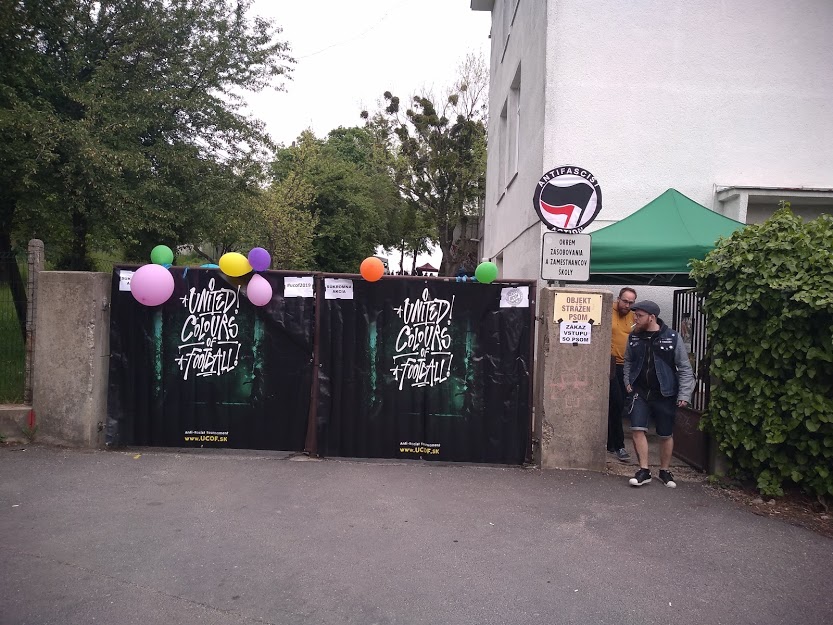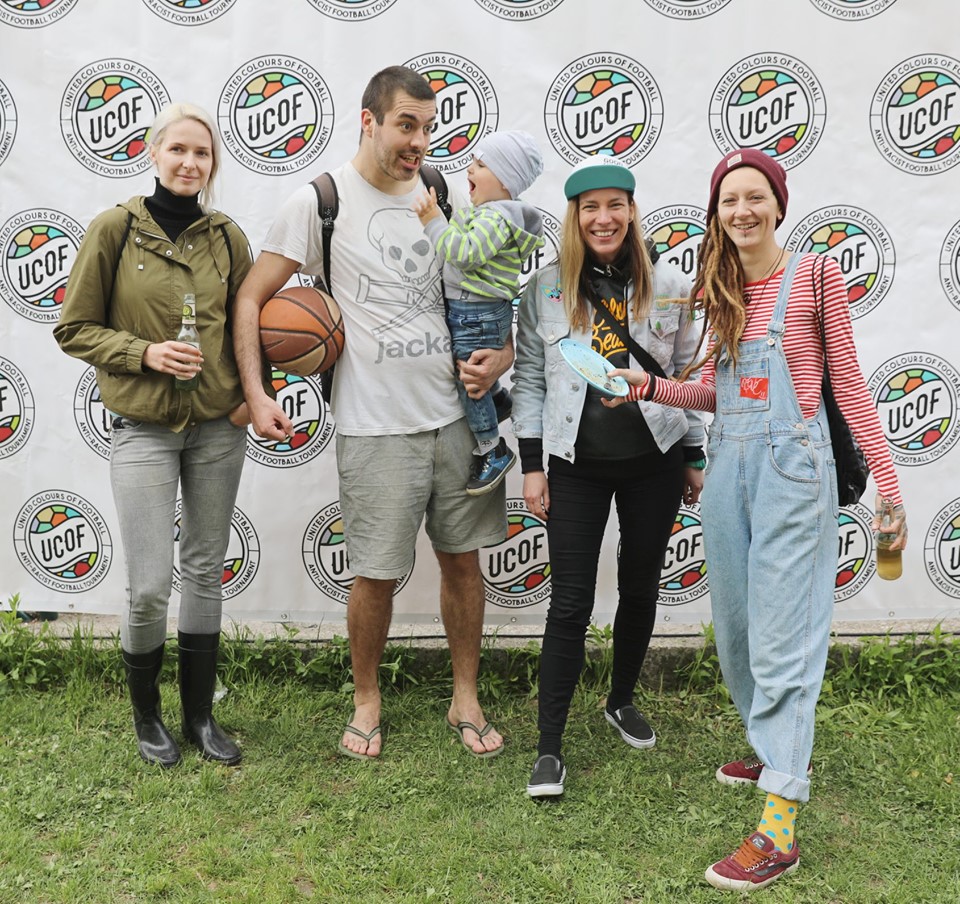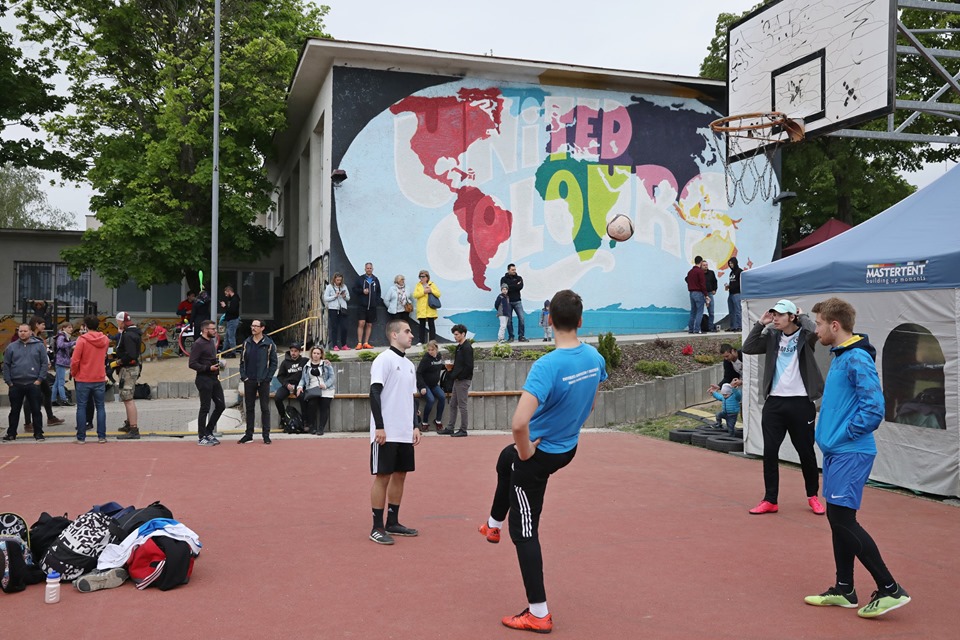Interview with Peter Vrbjar, co-founder of United Colours of Football Festival in Bratislava
Gates of the elementary school ZŠ Mudroňová, where the festival took place on May 4, 2019. Photo: Peter Sterančák
Peter Sterančák / May 11, 2019
( 6 min read )
On Saturday, May 4, there was a unique football event in Bratislava…
Up to the hill passing the Bratislava castle and Slovak National Parliament, then Hotel Bôrik, where fat cats of politics discuss their (sometimes) shady deals, there’s also an elementary school called ZŠ Mudroňova. I would probably never have known about it, if it weren’t a venue for the festival taking place every year around the anniversary of the end of the Second World War – United Colours of Football.
According to the official Facebook statement, it’s the anti-racist football tournament which celebrates diversity and the enriching aspect of different cultures in our own society. The organizers shy away from any form of discrimination based on nationality, race, gender or sexual orientation.
I was keen to interview one of them, Peter Vrbjar, to know more about this unique festival of tolerance, using football as its main attraction.
Official poster for the event. Photo credit: UCOF
I know that the first edition took place in 2011, so it’s 9 years now for you organizing the tournament. Why and when did you decide to organize such a festival? Where did the idea come from?
Yeah, it’s the 9th edition of the festival bearing this name; however, the tournament came to being by merging two football tournaments with an anti-racist theme. One of them was called “Football against pricks” and the second one was called “The rebel cup”. The rebel cup was more of a punk event, more subculture, I guess. A lot of members of our organizing team were a part of the rebel cup in the past. I think that’s why we have punk roots, so to speak. The tournament as we know it today was created because those two predecessors’ tournaments kind of died off, because organizers didn’t have the time or resources for it, anymore. So, we decided to unite those two events and create one platform for these types of tournaments.
When you look back 9 years ago at your first initial idea of what you want this tournament to be, would you say you succeeded in fulfilling your vision?
The initial vision was to professionalize these tournaments because before it was more of a friend gathering type of event. It wasn’t as much public, but rather it was more of a subculture thing. So, our idea was to create a tournament in which the public can participate in and access. At first, we didn’t have much ambitions except we wanted to preserve the spirit of those tournaments before and build upon that legacy, improve the quality and engage more people in it. Our ambition is not to change the whole society with this one football tournament, but we are ambitious in our effort to stress out the presence of racism, all sorts of phobias and other intolerant behaviors in football stadiums, sports in general and society as a whole.
That sounds great. Why did you choose football?
It’s because, in our region, football is the most popular sport among people. In fact, most of the youngsters at schools chose football as their favorite sports activity. They seem to enjoy it a lot and we love it too. We used to play in those school tournaments when we were kids. Most of us are football fans and we play it in our free time. Some of us played football even professionally. So, we love football, plus it’s a temptation for other people to compete in sports they love. For us, it’s way simpler to lure people to football than any other sports.
Hospitality tents at UCOF. Photo: Peter Sterančák
And why did you choose a school as a venue for the event? Have you thought about different options?
Yes, sure but since we do this event without any sponsors our priority was, first of all, to find a venue with at least two football pitches for a reasonable price. This school (ZŠ Mudroňova) luckily provides that for us. Also, we created all this with our own money and although we tried to find bigger venues, like universities or municipal places, they usually ask way too much money. The event pays itself from gastro-services we offer souvenirs or voluntary admission tickets. So, we stick to this venue that the school provides for us, but we think about different options now, since we surpassed our capacity for our participating teams. Our current limit is 32 teams, but this year we had over 50 teams applying.
Have you tried to approach the city of Bratislava, or sponsors? If so, how did they react?
We didn’t try approaching the city council or sponsors. The only sponsors that offer help are the ones that offer prices for the winners. But we haven’t asked for a financial sponsoring and neither sponsors offered their contribution. Although, this year, for the first time, we received an official auspice of the mayor of Bratislava, who played at this tournament from the very first edition we organized. But also, we clearly stated we don’t want any money from the city of Bratislava, or from anyone else, to sustain the principle of DIY (“do it yourself”) as independent people who just try to point at racism and other intolerance as a social phenomenon. So, as not to be connected with any specific sponsor or institution.
Current Mayor of Bratislava, Matúš Vallo. Photo: Miska G Photography ©
Since it’s 9 years you are doing this, how do you think the situation changed or hasn’t in football, regarding racism, homophobia, and hate of all sorts? Do you see any progress?
Well, to a certain extent you could say that with the overall decrease of neo-Nazis walking visibly in the streets, fewer neo-Nazis are also present at the football stadiums. They are the biggest proprietors of intolerance. However, the fact we don’t see them that much doesn’t mean they are not there. Unfortunately, football stadiums are still one of the most favorite places for them to gather. And it’s not only about the football fans anymore. For example, ever since Kotleba (ed. Note: the extremist far-right party of Marian Kotleba: Kotleba – Our Slovakia) is in the parliament we can see that these types of ideas promoting racism and intolerance become mainstream in our society and in politics. So, it would be naïve to claim that it has improved on our football stadiums, as well. Although, there are exceptions, like the football club AS Trenčín which has an anti-fascist fan club and it’s the bright exception in our Czech-Slovakian region, so to speak. But I have to say that the intolerance in football or hockey stadiums didn’t go away.
Discussion about climate change at UCOF. Photo: Peter Sterančák.
When you think about all this, how do you think, for example, Slovak Football Association (ed.note: SFZ in Slovak), should tackle the problem?
First of all, SFZ could and should tackle it. They should not perceive it as some minor problem of just some people booing at players, at this or that football match. They take this as some marginal problem although they claim otherwise in public. However, since the situation is still the same it can only mean two things: either they don’t pay attention to it, or they are professionally incapable to solve it. I’d say it’s mostly that they ignore it and in cases of intolerance, when even UEFA issue the fine for Slovak clubs for racist behavior of their fans, those fines are in thousands of euro which is a penny for oligarchs the type of Ivan Kmotrík. It’s laughable and there is no real effort to tackle the problem from the people that should be solving it. We can be trying to point at this problem with our tournaments for 9 or 10 years, but if competent people in the SFZ will not act, or the society will not change, then nothing will be changed.
To go back to the tournament though, if you could outline a vision of your future plans what would it look like?
We currently have around 800 visitors a year. It all depends on the weather so, as a result, we are also restricted by what we can offer the visitors. We can’t go into risky decisions as we don’t have big financial resources. We can’t afford expensive attractions, for example. We try to improve step by step, offering new workshops that tackle wider social issues. For example, this year there’s an interesting debate on climate change and other topics. Regarding our future, we think about possibilities to engage more players and more teams, because we have an increasing interest in participating in the actual football tournament. We’ll probably have to look for a bigger venue, too. Connected to that is our effort to expand our program for non-player visitors, as well.
So, how would you invite people for next year edition?
Next year we’ll have the 10th anniversary, so we already have an interesting music guest who promised us to be here next year. He’s currently one of the bigger names on one of the most prestigious Slovak festivals, so this could be interesting. Also, if we could move to the bigger venue it would be nice, however, it’s still to be decided. So, what I can promise for sure is that there will be some small improvements in the overall program of the festival and in the increased comfort for the visitors.
Official photo galery of UCOF
We thank organizers for allowing us to publish official photos from the event. Author: Miska G Photography ©
For full gallery visit official FB page of UCOF: https://www.facebook.com/pg/UnitedColoursOfFootball/photos/?ref=page_internal )

















